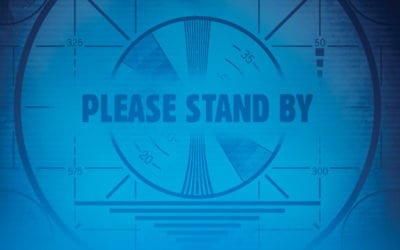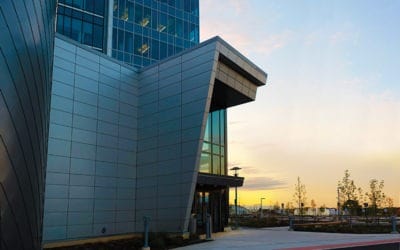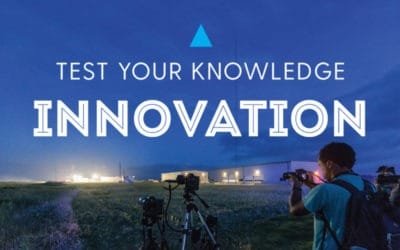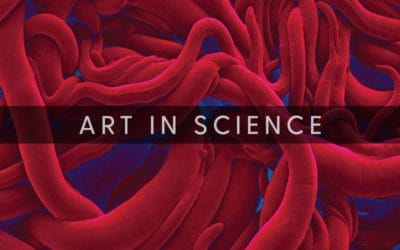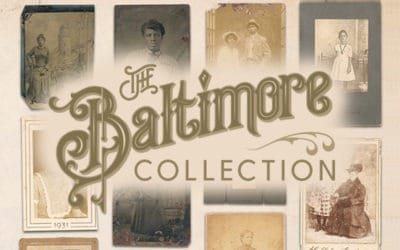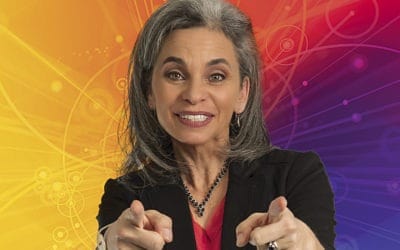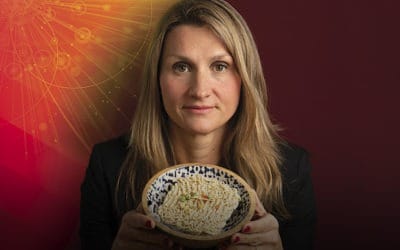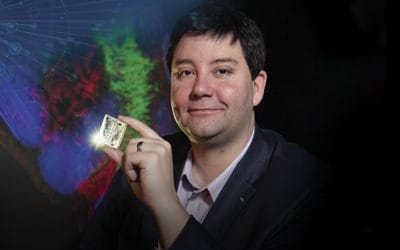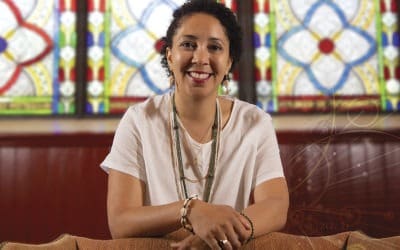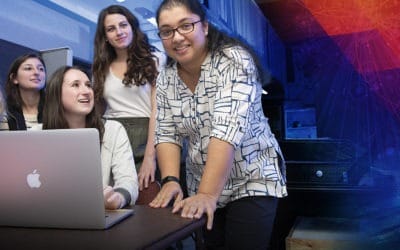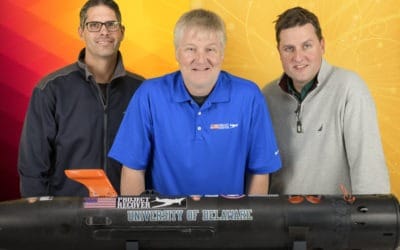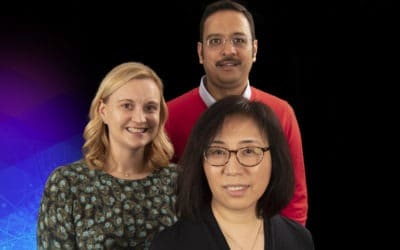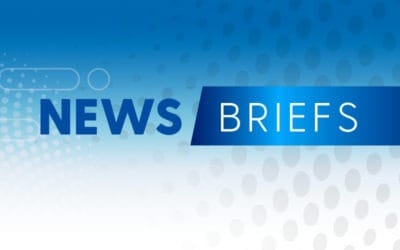‘Fighting astrophysicist’ named TED Fellow
Given the powerful intellect inside her skull, it’s a bit unnerving to watch UD astrophysicist Federica Bianco at work in the boxing ring, where she is nicknamed the “Mad Scientist.”
No, that’s not a typo. When she’s not trying to figure out how the universe works, Bianco moonlights as a professional boxer—bantamweight division.
Her outside-the-box approach to life and learning caught the imagination of the TED Fellows program and she was selected as one of only 20 fellows worldwide in the 2019 class.
“My idea to pitch to them is that we don’t need to be just one thing,” she said. “Strictly speaking, science and criminal justice and boxing—you might not put those things together. But I learn a lot of things in the ring that help in the sciences and vice versa.”
Bianco, who was born in Italy, is an assistant professor in the Department of Physics and Astronomy and in the Joseph R. Biden, Jr. School of Public Policy and Administration. She is involved in developing the largest astrophysical survey ever attempted—the Large Synoptic Survey Telescope (LSST) located in Chile, which will image the entire Southern Hemisphere sky every three days or so.
She also has applied her data analysis expertise to issues of prosecutorial justice, especially delays in Santa Clara, California, and urban health in New York City.
Federica Bianco
Valerie Earnshaw
Earnshaw lauded nationally for stigma research
She interviewed him at the methadone clinic. He had HIV and a heroin use disorder. Valerie Earnshaw was in graduate school at the time, gathering data for her psychology research. What he told her will stay with her forever.
“He said doctors wouldn’t touch him in the early days of his HIV care, which made him feel awful,” Earnshaw said. “He said he would never forget the first time he was touched in a doctor’s office. Being touched in a positive way was such a humanizing experience.”
Such moments have steeled Earnshaw’s resolve to understand the stigma facing people with HIV and to spur positive change. Although she has been on the faculty of UD’s College of Education and Human Development only since 2016, the social psychologist already has won national recognition for her work.
At the National Institutes of Health this past March, Earnshaw delivered the Office of Disease Prevention’s Early Stage Investigator Lecture, an honor reserved for scientists poised to become future research leaders.
In Chicago this summer, she received the American Psychological Association’s 2019 Psychology and AIDS Distinguished Leadership Award, as an emerging leader, for her contributions to understanding and addressing the mechanisms underlying HIV stigma through research, policy work and advocacy.
Policy expert earns top book award
Kara Ellerby, associate professor of political science and international relations, has received the American Political Science Association’s 2018 Victoria Schuck Award for best book on women and politics.
Ellerby’s No Shortcut to Change: An Unlikely Path to a More Gender Equitable World, published by New York University Press, examines what Ellerby describes as the weaknesses that are inherent in international gender policy. The book offers a historical, theoretical and political overview of why recent policies to improve women’s status in the world have not been effective.
“Kara Ellerby’s book is necessary and required reading for all those engaged with debates on gender empowerment, equality, equity or quotas in global or national contexts,” wrote women’s studies scholar Inderpal Grewal, a professor at Yale. The book, she said, makes “a powerful and lucid argument” that has advanced feminist politics.
Ellerby, who also holds a joint appointment in the Department of Women and Gender Studies, joined the UD faculty in 2011. In addition to her research, she teaches graduate and undergraduate classes, including a new course on the politics of diversity.
Kara Ellerby
Ramona Neunuebel
Neunuebel wins NSF Career Award
Ramona Neunuebel, assistant professor of biological sciences, has won a prestigious National Science Foundation Faculty Early Career Development Award. With the five-year, $750,498 grant, NSF recognizes the significant potential of Neunuebel’s work on how Legionella pneumophila bacteria elude and manipulate the defense systems of the host cells they target and infiltrate.
The Legionella bacterium is named for a 1976 outbreak of respiratory disease that it caused during an American Legion convention in Philadelphia. The bacterium lends itself well to Neunuebel’s research questions because it does extraordinary things to thrive and multiply once it enters a cell.
When Legionella meets an amoeba, for example, the amoeba wraps itself around the bacterium and starts a process to degrade and ultimately kill the intruder. But the bacterium has other plans. Once engulfed by the host cell, it remodels the membrane of what was meant to be a death chamber into a separate cocoon-like place where it not only escapes certain death but is able to multiply.
“It’s molecular camouflage,” she said. “For healthy individuals, it is usually not an issue. But for those whose immune systems are weakened, they could be at risk for developing a serious and potentially fatal form
of pneumonia.”
This fundamental work aims to shed light on the devices used by other bacteria that create their own protective compartments and could have implications for related diseases such as tuberculosis.
UD senior awarded distinguished Gates Cambridge Scholarship
Bailey Weatherbee’s passion for developmental biology stems from her childhood. Her mother had multiple miscarriages leading to the discovery that her father had a genetic mutation called chromosomal translocation.
Weatherbee, who graduated this past May with an Honors Bachelor of Science with Distinction in Biological Sciences, said this experience inspired her curiosity to learn the basics of human life on a biological level.
“My dad always had this mentality of explaining things to me at the highest level and expecting that I had the capability to understand,” she said. “So when I asked why I didn’t have siblings, he tried to explain this to me. I didn’t really get it, but I wanted to, so that started me down the path of asking biological questions.”
Weatherbee recently won a Gates Cambridge Scholarship. The honor goes to applicants who demonstrate outstanding intellectual ability, leadership potential and a commitment to improving the lives of others. The scholarship covers all fees while a student earns a master’s or doctoral degree at Cambridge University in England.
Weatherbee will begin her doctorate in physiology, development and neuroscience under Magdalena Zernicka-Goetz in October. She is the second student in UD history to win the scholarship, which was established in 2000 by the Bill and Melinda Gates Foundation.
Bailey Weatherbee
Yushan Yan
Yan inducted as Fellow of National Academy of Inventors
Yushan Yan, Distinguished Engineering Professor in chemical and biomolecular engineering, has been inducted as a Fellow of the National Academy of Inventors. It is the highest professional distinction accorded solely to academic inventors who have demonstrated a prolific spirit of innovation yielding outstanding inventions that have made a tangible impact on quality of life, economic development and the welfare of society.
Yan is doing his part to engineer a sustainable future. Much of his research focuses on fuel cells, which convert chemical energy into electricity to power cars without producing pollution.
He has been an inventor on more than 25 issued or pending patents and is the founder and co-founder of several startups including W7energy, which designs, develops and manufactures platinum-free fuel cell membranes. He also introduced the use of zeolite minerals into membranes for desalination, and the startup company, NanoH2O, founded to commercialize his nanocomposite desalination membrane technology, was acquired by LG Chemicals in 2014.
Yan joined UD in 2011. He has published over 200 articles, which have been cited more than 21,000 times, according to Google Scholar.
MORE STORIES
From the Vice President for Research, Scholarship and Innovation
A disruptor prevents things from proceeding as usual. But that’s not always bad. In research and education, we’re always turning ideas and methods on their ear in the quest to learn something new…
Innovation In Motion
UD researchers partner with Reebok to build a “smart” sports bra — a sports bra engineered to actually do its job!
Disruptors
This issue of the University of Delaware Research magazine puts new faces on this idea of disruption, highlighting the innovative way our researchers are tackling complex problems. Learn about their work and what drives them and how the disruption they cause can produce real benefit for our world.
Bright Star
UD’s Science, Technology and Advanced Research (STAR) Campus is shining ever brighter with the nationally recognized Tower at STAR.
Test Your Knowledge: Innovation
As a growing research institution, the University of Delaware is a place where you’ll find new ideas constantly sparking solutions to challenges once deemed impossible.The wonder of innovation is all around us, but what do you really know about it? Try your hand at these questions.
Art In Science
Now in its fourth year, this annual exhibit offers a captivating glimpse into a vast world of discovery at the University of Delaware.
The Baltimore Collection
Something truly special emerged from a box that no one expected until Julie McGee, associate professor of Africana Studies and Art History, and her University of Delaware students got their hands on the 53 photographs inside.
Disruptors: Probing the Power of Paradox
A professor of management at UD’s Lerner College of Business and Economics, Wendy Smith focuses on how leaders and teams can effectively respond to contradictory agendas.
Disruptors: Defending Equal Access to Food
How does a new supermarket impact people who live nearby? Can healthy options be found in the little store down the street? These are questions that Allison Karpyn ponders regularly.
Disruptors: Cracking a Cell’s Secret Code
Jason Gleghorn has held a variety of jobs since college—teacher, firefighter, medic, engineer. Today, he’s an interpreter of sorts, too, deciphering the language that cells use to communicate in hopes of advancing new treatments for congenital birth defects, pediatric diseases and more.
Disruptors: Making Our Way
Professor of Africana studies at UD and an ordained elder in the African Methodist Episcopal Church, Monica A. Coleman focuses on the role of faith in addressing critical social and philosophical issues.
Disruptors: Moving Forward with Autism
With skills in physical therapy, behavioral neuroscience and biomechanics, Anjana Bhat brings expansive expertise to her work developing creative therapies for those living with autism spectrum disorders.
Disruptors: Expanding Our World View
These co-founders of the Robotic Discovery Laboratories in UD’s College of Earth, Ocean and Environment manage a growing robotics fleet for use on land, in air and under the sea. They explore questions along the coast, at the poles and in deep regions of the ocean.
Disruptors: Harnessing Beneficial Microbes
So, what do a virologist, botanist and soil physicist have in common? This team from UD’s College of Agriculture and Natural Resources is leveraging their collective expertise to ensure that our food supply is safe and abundant, now and in the future.
News Briefs
Check out some recent developments, from the launching of major research programs to address environmental and health issues in the First State, to the preservation of a pair of 1909 mittens with a hallowed history.
CONTACT
Tracey Bryant
Senior Director, Research Communications
Email: tbryant@UDel.Edu
SUBSCRIBE & CONNECT
The University of Delaware Research magazine showcases the discoveries, inventions and excellence of UD’s faculty, staff and students. Sign up for a free subscription.




